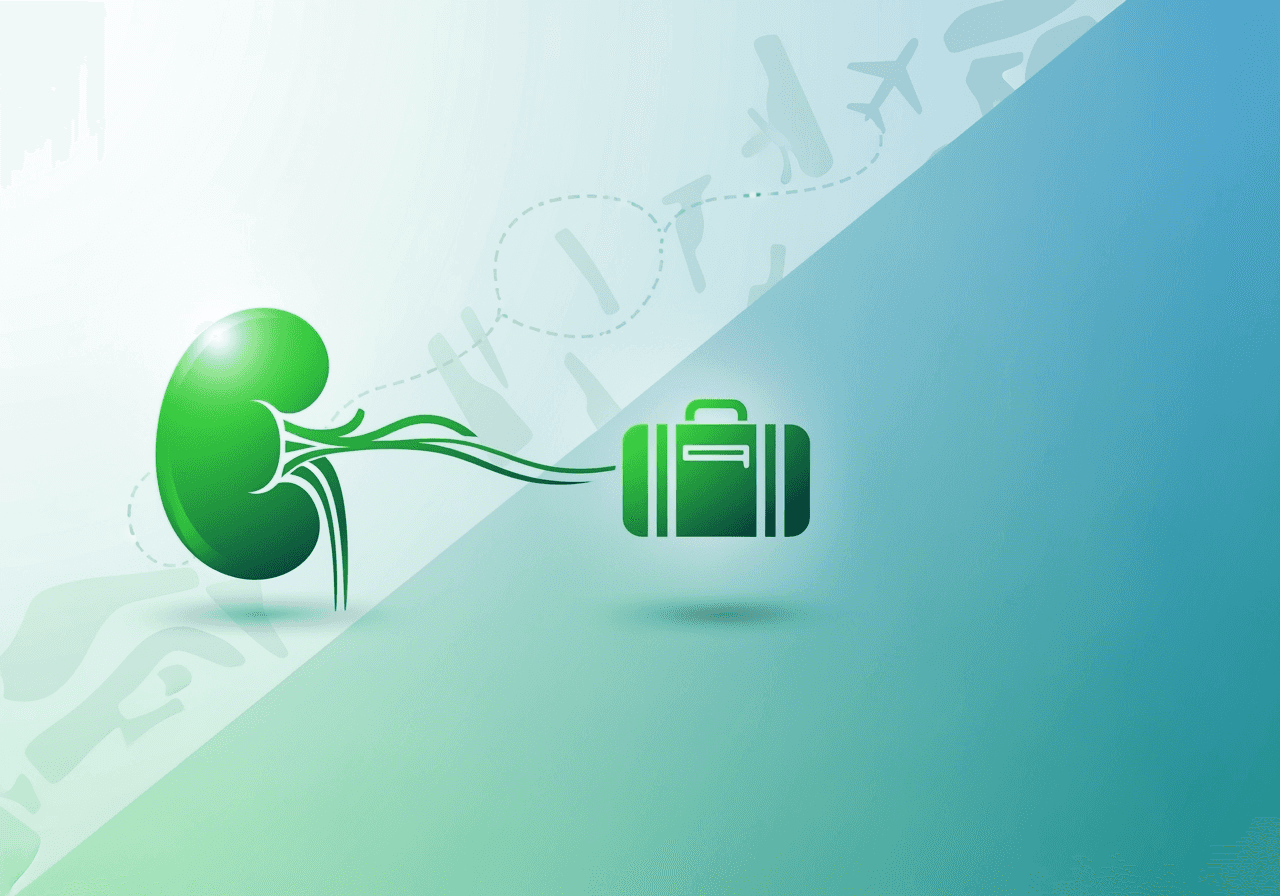
Healthtrip Experts Explain the Complete Kidney Transplant Process
30 Oct, 2025
 Healthtrip
Healthtrip- #1. Who Needs a Kidney Transplant?
- #2. Where Can a Kidney Transplant Be Done?
- Saudi German Hospital Alexandria, Egypt
- Fortis Escorts Heart Institute, New Delhi
- Fortis Shalimar Bagh, Delhi
- Yanhee International Hospital, Bangkok
- Vejthani Hospital, Bangkok
- Memorial Bahçelievler Hospital, Istanbul
- Memorial Sisli Hospital, Istanbul
- NMC Specialty Hospital, Al Nahda, Dubai
- Thumbay Hospital, Dubai
- Saudi German Hospital Cairo, Egypt
- Helios Klinikum Erfurt, Germany
- Helios Emil von Behring, Berlin
- Helios Klinikum München West, Germany
- Fortis Hospital, Noida
- Fortis Memorial Research Institute, Gurgaon
- Max Healthcare Saket, New Delhi
- Pantai Hospital Kuala Lumpur
- KPJ Ampang Puteri Specialist Hospital, Kuala Lumpur
- Saudi German Hospital Al-Madinah Almonawara
- Saudi German Hospital Dammam
- Saudi German Hospital Hail
- Mount Elizabeth Hospital, Singapore
- Singapore General Hospital, Singapore
- Jiménez Díaz Foundation University Hospital, Madrid
- Quironsalud Hospital Murcia, Spain
- Bangkok Hospital, Thailand
- BNH Hospital, Bangkok
- LIV Hospital, Istanbul
- Hisar Intercontinental Hospital, Istanbul
- NMC Royal Hospital, DIP, Dubai
- NMC Royal Hospital Sharjah
- NMC Specialty Hospital, Abu Dhabi
- Cleveland Clinic London
- #3. Types of Kidney Transplants
- #4. How is a Kidney Transplant Performed?
- #5. Kidney Transplant Success Stories
- #6. Kidney Transplant Risks and Complications
- #7. Conclusion
Initial Evaluation and Preparation
The kidney transplant journey begins with a comprehensive evaluation to determine if you are a suitable candidate for the procedure. This isn't just a simple check-up; it's an in-depth assessment of your overall health, including your cardiovascular system, immune system, and any other underlying medical conditions. Doctors at facilities like Fortis Memorial Research Institute, Gurgaon, or the Saudi German Hospital Cairo, Egypt, will conduct a series of tests, including blood tests, urine tests, and imaging studies, to evaluate your kidney function and identify potential risks. The psychological evaluation is equally important. The transplant team wants to ensure you’re mentally and emotionally prepared for the journey ahead, which includes the surgery itself, post-transplant medications, and lifestyle adjustments. Finding a compatible donor is paramount, and this involves matching blood types and tissue types. The closer the match, the lower the risk of rejection. If a suitable living donor isn't available, you'll be placed on a national waiting list for a deceased donor kidney. This waiting period can vary, depending on your blood type, tissue type, and the availability of organs in your region. While you wait, maintaining your health through dialysis, diet, and exercise is crucial to ensure you're in the best possible condition when a kidney becomes available. Healthtrip experts can help you find the best doctors and hospitals to help you in this process.
Most popular procedures in India
The Kidney Transplant Surgery
The day of the transplant arrives, you'll be admitted to the hospital, often facilities like Bangkok Hospital or Quironsalud Hospital Murcia, and prepped for surgery. Kidney transplant surgery typically takes between two to four hours, and it's performed under general anesthesia, ensuring you're comfortable and pain-free. The surgeon will make an incision in your abdomen to implant the new kidney. Your native kidneys are usually left in place unless they are causing complications such as high blood pressure, infection, or are enlarged. The donor kidney is connected to your blood vessels and bladder, allowing it to filter waste and produce urine. The surgical techniques used by surgeons at NMC Specialty Hospital, Al Nahda, Dubai, and Vejthani Hospital in Bangkok, among others, are constantly evolving, with a focus on minimally invasive approaches to reduce recovery time and scarring. After the surgery, you'll be closely monitored in the recovery room. The medical team will watch for any immediate complications, such as bleeding or blood clots. Pain management is a key part of post-operative care, and you'll receive medication to help you stay comfortable. The goal is to get the new kidney functioning as soon as possible, and you’ll start with a course of immunosuppressant medications to prevent your body from rejecting the new organ. Healthtrip is can help you find the options that suits your needs.
Post-Transplant Care and Recovery
After the surgery, the road to recovery begins and it requires diligent self-care and adherence to your medical team's instructions. Staying at facilities like Fortis Escorts Heart Institute, New Delhi, allows for close monitoring during those crucial early days. Immunosuppressant medications are a cornerstone of post-transplant care, and they prevent your body from rejecting the new kidney. However, these medications also weaken your immune system, making you more susceptible to infections. You will need to monitor for signs of infection, such as fever, chills, or redness around the incision site. Regular blood tests are essential to monitor your kidney function and medication levels. Diet and exercise play a vital role in your recovery. A healthy diet can help manage your weight, blood pressure, and cholesterol levels, while regular exercise can improve your strength and stamina. Emotional support is also crucial, and connecting with other transplant recipients or joining a support group can provide a sense of community and understanding. Over time, you'll gradually return to your normal activities, but it's important to avoid strenuous activities and contact sports for at least a few months. With proper care and monitoring, a kidney transplant can significantly improve your quality of life, allowing you to live a longer, healthier, and more fulfilling life. With Healthtrip, you’ll be able to take all the necessary steps to recover as fast and as safely as possible with facilities such as Yanhee International Hospital.
Wellness Treatments
Give yourself the time to relax
Lowest Prices Guaranteed!

Lowest Prices Guaranteed!
Potential Risks and Complications
Like any major surgery, kidney transplantation comes with potential risks and complications. Understanding these risks is important for making informed decisions about your health. Rejection is one of the most significant concerns, and it occurs when your immune system attacks the new kidney. Immunosuppressant medications help prevent rejection, but they also increase your risk of infection. Infections can range from minor colds to severe illnesses, such as pneumonia, so it's important to practice good hygiene and avoid contact with people who are sick. Surgical complications can include bleeding, blood clots, and wound infections. These complications are typically managed with medication or additional surgery. Long-term use of immunosuppressant medications can also lead to other health problems, such as high blood pressure, high cholesterol, diabetes, and certain types of cancer. Regular check-ups and screenings are essential for detecting these problems early. Some people may also experience emotional challenges after transplant, such as anxiety, depression, or feelings of isolation. Talking to a therapist or joining a support group can help you cope with these challenges. While the risks and complications associated with kidney transplantation can be daunting, the benefits often outweigh the risks. A successful kidney transplant can significantly improve your quality of life, allowing you to live a longer, healthier, and more fulfilling life. Healthtrip’s goal is to help you find the best medical professions such as those working for Mount Elizabeth Hospital to minimize any risk and complication during the kidney transplant process.
#1. Who Needs a Kidney Transplant?
Imagine your kidneys, those unsung heroes working tirelessly to filter waste and excess fluids from your blood, suddenly decide to take an extended vacation. That's essentially what happens in end-stage renal disease (ESRD), also known as kidney failure. When your kidneys can no longer perform their vital functions, toxins build up in your body, leading to a cascade of health problems. This isn't just about feeling a bit under the weather; it's a serious, life-threatening condition. Dialysis, a procedure that artificially filters the blood, can help keep you alive, but it's often a temporary fix, not a long-term solution. This is where a kidney transplant enters the picture, offering a chance at a healthier, more fulfilling life. A kidney transplant involves surgically implanting a healthy kidney from a donor into a person with kidney failure, taking over the functions the diseased kidneys can no longer perform. It's like giving your body a brand new, fully functional filtration system.
But who exactly qualifies for this life-changing procedure? The primary candidates are individuals diagnosed with ESRD, meaning their kidneys are functioning at less than 15% of their normal capacity. This diagnosis usually comes after a series of tests and evaluations by a nephrologist, a doctor specializing in kidney diseases. However, having ESRD isn't an automatic ticket to the transplant list. Several factors are considered to ensure the transplant is both safe and likely to succeed. These include your overall health, age, and the presence of any other serious medical conditions. For instance, individuals with severe heart disease, active infections, or certain types of cancer may not be eligible. The goal is to ensure that the potential benefits of the transplant outweigh the risks. The evaluation process is rigorous and comprehensive, involving a team of doctors, nurses, and social workers who work together to determine if you're a good candidate. They'll assess your physical and mental health, review your medical history, and discuss the potential risks and benefits of the procedure with you and your family.
The decision to pursue a kidney transplant is a deeply personal one, and it's essential to have all the information you need to make an informed choice. While it offers the possibility of a longer, healthier life, it's also a major surgery with potential complications and requires lifelong commitment to immunosuppressant medications to prevent your body from rejecting the new kidney. These medications can have side effects, and you'll need regular checkups to monitor your health and ensure the transplant is functioning correctly. However, for many people, the benefits far outweigh the risks. A successful kidney transplant can free you from the constraints of dialysis, allowing you to travel, work, and enjoy a more normal life. It can also improve your energy levels, appetite, and overall sense of well-being. If you're living with ESRD, talk to your doctor about whether a kidney transplant might be right for you. It could be the key to unlocking a brighter, healthier future, offering a chance to reclaim your life and live it to the fullest.
#2. Where Can a Kidney Transplant Be Done?
Embarking on the journey of a kidney transplant is a significant decision, and one of the first questions that often arises is: where can this life-altering procedure be performed? Fortunately, kidney transplant centers exist worldwide, each offering specialized care and expertise. However, choosing the right center is crucial for ensuring the best possible outcome. Factors to consider include the center's experience, success rates, the availability of advanced technology, and the expertise of the transplant team. You'll also want to think about practical considerations like location, cost, and whether the center accepts your insurance. Healthtrip can assist you in navigating these choices, providing information and support to help you find the ideal transplant center for your specific needs.
Many reputable hospitals across the globe offer kidney transplant programs. In Egypt, you can consider Saudi German Hospital Alexandria and Saudi German Hospital Cairo as potential options. These hospitals are known for their comprehensive medical services and experienced medical teams. In India, Fortis Shalimar Bagh and Fortis Memorial Research Institute, Gurgaon and Max Healthcare Saket offer advanced transplant facilities. Thailand is another popular destination for medical tourism, with hospitals like Yanhee International Hospital and Vejthani Hospital providing kidney transplant services. Moving to Turkey, Memorial Bahçelievler Hospital and Memorial Sisli Hospital are well-regarded for their transplant programs. In the UAE, NMC Specialty Hospital, Al Nahda, Dubai and Thumbay Hospital are worth considering. Germany also boasts excellent medical facilities, including Helios Klinikum Erfurt and Helios Emil von Behring. Finally, for those seeking treatment in the UK, Cleveland Clinic London offers state-of-the-art facilities and experienced transplant teams.
Choosing a kidney transplant center is not just about geography; it's about finding a team you trust and a facility that meets your individual needs. Don't hesitate to ask questions, seek second opinions, and explore all your options. Healthtrip can be your partner in this process, providing you with the information and support you need to make the best decision for your health and well-being. Consider factors such as the hospital's accreditation, its patient-to-staff ratio, and the availability of support services like counseling and rehabilitation programs. Furthermore, research the transplant team's experience with different types of transplants and their success rates with patients who have similar medical histories to yours. Ultimately, the best kidney transplant center is the one that makes you feel comfortable, confident, and well-cared for. Take your time, do your research, and let Healthtrip guide you toward a brighter, healthier future.
#3. Types of Kidney Transplants
When it comes to kidney transplants, one size doesn't fit all. There are several types of transplants, each with its own set of considerations and benefits. Understanding these different types can help you and your medical team determine the best approach for your specific situation. The two primary categories of kidney transplants are deceased donor transplants and living donor transplants. Let's delve into each of these in more detail. A deceased donor transplant involves receiving a kidney from someone who has recently passed away and whose family has consented to organ donation. This is the most common type of kidney transplant, and it relies on organ procurement organizations to match available kidneys with suitable recipients on the national transplant waiting list. The waiting time for a deceased donor kidney can vary depending on several factors, including your blood type, tissue type, and overall health. It's like waiting for a perfectly matched puzzle piece to become available, and while the wait can be long, it's often worth it for the chance to regain your health and independence.
On the other hand, a living donor transplant involves receiving a kidney from a living person, such as a family member, friend, or even an altruistic stranger. This type of transplant offers several advantages over deceased donor transplants, including shorter waiting times, better long-term outcomes, and the opportunity to schedule the surgery at a time that's convenient for both the donor and recipient. Living donor transplants can be further divided into directed donation, where the donor specifically designates the recipient, and non-directed donation, where the donor donates a kidney to anyone in need. Finding a living donor can be a challenging but rewarding process. It requires open communication with your loved ones and a willingness to share your story and needs. Healthtrip can provide resources and support to help you navigate this process, connecting you with organizations and individuals who can offer guidance and encouragement. Ultimately, the decision of whether to pursue a deceased donor or living donor transplant depends on your individual circumstances and preferences.
Beyond the source of the kidney, there are also different surgical approaches to kidney transplantation. Traditional open surgery involves making a larger incision to implant the new kidney, while minimally invasive techniques, such as laparoscopic or robotic-assisted surgery, use smaller incisions and specialized instruments. Minimally invasive approaches often result in less pain, shorter hospital stays, and faster recovery times. Regardless of the type of transplant you choose, the goal is the same: to restore kidney function and improve your quality of life. The transplant team will work closely with you to evaluate your health, discuss your options, and develop a personalized treatment plan that meets your unique needs. Kidney transplantation is a complex and multifaceted process, but with the right information and support, you can make informed decisions and embark on this journey with confidence.
Also Read:
#4. How is a Kidney Transplant Performed?
Embarking on a kidney transplant journey can feel like navigating uncharted waters. At Healthtrip, we understand that knowledge is power, especially when it comes to your health. So, let's demystify the process of how a kidney transplant is performed. The surgery itself typically takes several hours, and it's a meticulous procedure. General anesthesia is administered, ensuring you're comfortably asleep throughout. The surgical team makes an incision in your abdomen, carefully placing the new kidney. Unlike your original kidneys, which remain in place unless they're causing complications, the transplanted kidney is positioned in the lower abdomen for easier access and connection to blood vessels and the bladder. Surgeons meticulously connect the renal artery and vein of the new kidney to your iliac artery and vein. Then, they attach the ureter, the tube that carries urine, to your bladder. Once blood flow and urine production are confirmed, the incision is carefully closed. The dedicated medical professionals at hospitals we work with, such as Fortis Hospital, Noida, and Saudi German Hospital Cairo, Egypt, are equipped to guide you through each step with compassion and expertise, ensuring you are well-informed at every stage.
The beauty of modern medicine lies in its constant evolution. In some cases, a minimally invasive approach called laparoscopic kidney transplantation may be an option. This involves smaller incisions, leading to reduced pain and a quicker recovery. Healthtrip collaborates with leading hospitals like Fortis Memorial Research Institute, Gurgaon, which offer advanced surgical techniques like laparoscopy, ensuring patients benefit from the least invasive and most effective treatments available. The journey doesn't end with the surgery, though. Post-transplant care is crucial. You'll be closely monitored in the hospital for several days to ensure the new kidney functions correctly. Regular blood tests and check-ups will become part of your routine to monitor kidney function and detect any potential complications early on. Additionally, you'll need to take immunosuppressant medications to prevent your body from rejecting the new kidney. These medications are essential for the long-term success of the transplant and require careful management under the supervision of a nephrologist.
Remember, a kidney transplant is a significant step towards a healthier, more fulfilling life. While it's natural to feel apprehensive, Healthtrip is here to assist you by helping you connect with world-class medical facilities and compassionate healthcare professionals who prioritize your well-being. From the initial consultation to post-operative care, we're committed to providing you with the tools and resources you need to make informed decisions and navigate your transplant journey with confidence. Hospitals like Max Healthcare Saket, and Vejthani Hospital in Bangkok, are among the many facilities in our network that offer comprehensive transplant programs with a focus on patient-centered care. At Healthtrip, we believe that every patient deserves access to the best possible care.
Also Read:
#5. Kidney Transplant Success Stories
Behind every successful kidney transplant, there's a story of resilience, hope, and the unwavering dedication of medical professionals. At Healthtrip, we believe in sharing these stories to inspire others facing similar health challenges. These aren't just statistics; they're real people regaining their lives, thanks to the gift of a new kidney. Take, for example, the story of a young woman named Sarah, who battled kidney disease for years. Dialysis became her constant companion, limiting her ability to work, travel, and even enjoy simple pleasures. After a successful kidney transplant at Fortis Escorts Heart Institute, she's now pursuing her dream of becoming a teacher, her life transformed by the generosity of a donor and the skill of her medical team. Sarah's story is just one of many. We've heard countless inspiring accounts of individuals returning to work, starting families, and pursuing their passions after receiving a kidney transplant. These successes underscore the incredible potential of transplantation to restore health and improve quality of life.
The success of kidney transplantation is also reflected in the data. Studies show that the long-term survival rates for kidney transplant recipients are significantly higher than those who remain on dialysis. With advancements in immunosuppressant medications and surgical techniques, the outcomes continue to improve. Healthtrip is committed to connecting patients with hospitals that have a proven track record of successful kidney transplants. Facilities like Saudi German Hospital Alexandria, Egypt, and Jiménez Díaz Foundation University Hospital in Madrid, are known for their expertise in transplantation and their commitment to patient-centered care. These hospitals employ multidisciplinary teams of nephrologists, surgeons, nurses, and other specialists who work together to ensure the best possible outcome for each patient. Furthermore, these success stories extend beyond the individual level. They highlight the power of organ donation to transform lives and the importance of raising awareness about the need for more donors. By sharing these stories, we hope to encourage more people to consider becoming organ donors and to support organizations that are working to improve access to transplantation.
At Healthtrip, we understand that choosing to undergo a kidney transplant is a big decision. These success stories offer a glimpse of what's possible, providing hope and encouragement to those who are considering this life-changing procedure. We're here to provide you with the information, resources, and support you need to make informed decisions and to connect you with the best possible medical care. Whether you're seeking a transplant in your home country or exploring options abroad, Healthtrip can help you navigate the process and find a hospital that's right for you. Consider hospitals like Mount Elizabeth Hospital in Singapore or Quironsalud Hospital Murcia in Spain, both recognized for their excellent transplant programs.
Also Read:
#6. Kidney Transplant Risks and Complications
Undergoing a kidney transplant is a significant decision, and it's crucial to be fully aware of the potential risks and complications involved. At Healthtrip, we believe in transparently providing you with all the necessary information to make informed choices about your health. While kidney transplantation offers a chance at a healthier life, it's not without its challenges. One of the primary risks is organ rejection. Your body's immune system may recognize the new kidney as foreign and attempt to attack it. That's why transplant recipients need to take immunosuppressant medications for the rest of their lives. These drugs suppress the immune system, preventing rejection, but they also come with their own set of side effects. Common side effects of immunosuppressants include an increased risk of infections, high blood pressure, high cholesterol, and an increased risk of certain types of cancer. Healthtrip partners with leading hospitals, such as Yanhee International Hospital, Bangkok, that specialize in managing these risks and side effects, offering personalized treatment plans to minimize complications.
In addition to rejection and medication side effects, other potential complications of kidney transplantation include surgical complications, such as bleeding, blood clots, or infection at the incision site. There's also a risk of the new kidney not functioning properly, a condition known as delayed graft function. This may require temporary dialysis until the kidney starts working. Furthermore, some transplant recipients may experience complications related to their underlying kidney disease or other pre-existing health conditions. At Healthtrip, we emphasize the importance of choosing a hospital with a strong track record in transplantation and a multidisciplinary team of experts who can address these potential complications. Hospitals like Memorial Sisli Hospital, Istanbul, and Singapore General Hospital, are equipped with state-of-the-art facilities and experienced medical professionals who can provide comprehensive care throughout the transplant process.
It's important to remember that the risks and complications of kidney transplantation vary from person to person. Your individual risk profile depends on factors such as your age, overall health, and the presence of other medical conditions. Before undergoing a transplant, your medical team will thoroughly evaluate your health and discuss the potential risks and benefits with you. Healthtrip encourages you to ask questions, express your concerns, and actively participate in the decision-making process. We're here to connect you with doctors and hospitals that prioritize patient education and shared decision-making. Consider facilities like NMC Specialty Hospital, Al Nahda, Dubai, and Cleveland Clinic London, which are known for their commitment to providing patients with the information and support they need to make informed choices about their care. At Healthtrip, we strive to empower you with the knowledge and resources you need to navigate your kidney transplant journey safely and confidently.
Also Read:
#7. Conclusion
The journey towards a kidney transplant is undoubtedly a complex one, filled with both challenges and immense hope. As we've explored, understanding the entire process, from assessing candidacy to navigating potential risks and celebrating success stories, is crucial for making informed decisions. At Healthtrip, we recognize the weight of this decision and are dedicated to providing a supportive and comprehensive platform to guide you every step of the way. Whether you're starting to research your options, are actively seeking a transplant center, or require assistance with post-transplant care, Healthtrip is here to connect you with world-class medical expertise. Remember, you are not alone in this journey. Millions of people worldwide have successfully undergone kidney transplants, reclaiming their health and regaining the freedom to live fuller, more active lives. The hospitals within our network, such as Vejthani Hospital in Bangkok, offer state-of-the-art facilities and experienced medical teams committed to delivering exceptional care and support.
We encourage you to delve deeper into specific aspects of kidney transplantation that pique your interest. Contact Healthtrip for personalized assistance in finding the right doctor, hospital, or treatment plan tailored to your individual needs. Our team can assist with everything from arranging consultations and travel logistics to providing ongoing support and resources throughout your journey. Ultimately, a kidney transplant is a life-changing decision that requires careful consideration, open communication with your medical team, and a strong support system. Healthtrip is committed to being a trusted partner in this journey, empowering you with the knowledge, resources, and connections you need to make informed decisions and achieve the best possible outcome. Consider exploring options at hospitals like Fortis Hospital, Noida, or Saudi German Hospital Cairo, Egypt, both known for their comprehensive transplant programs and patient-centered approach.
At Healthtrip we are dedicated to providing transparent, accessible and affordable healthcare solutions. A kidney transplant can significantly improve your quality of life, allowing you to return to work, pursue your hobbies, and spend more time with loved ones. Embrace the possibilities that a kidney transplant can offer, and let Healthtrip be your guide to a healthier, more fulfilling future. Take the first step today by visiting our website or contacting our team to learn more about kidney transplantation and how we can help you on your path to wellness. Remember, a healthier tomorrow is within reach, and Healthtrip is here to assist you every step of the way. < /p>
Related Blogs

Long-Term Follow-Up After Eye Surgery
Detailed insights into eye surgery – doctors, hospitals, technology, recovery,

Healthtrip’s Transparency in Eye Surgery Pricing and Packages
Detailed insights into eye surgery – doctors, hospitals, technology, recovery,

Frequently Asked Questions About Eye Surgery
Detailed insights into eye surgery – doctors, hospitals, technology, recovery,

Advanced Robotic Technology Used in Eye Surgery
Detailed insights into eye surgery – doctors, hospitals, technology, recovery,

How Healthtrip Supports Foreign Patients for Eye Surgery in India
Detailed insights into eye surgery – doctors, hospitals, technology, recovery,

Top Medical Packages for Eye Surgery Offered by Healthtrip
Detailed insights into eye surgery – doctors, hospitals, technology, recovery,










